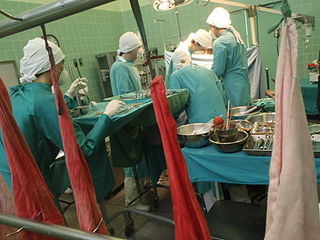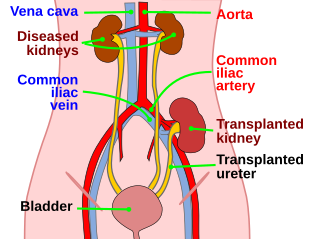Related Research Articles

Organ transplantation is a medical procedure in which an organ is removed from one body and placed in the body of a recipient, to replace a damaged or missing organ. The donor and recipient may be at the same location, or organs may be transported from a donor site to another location. Organs and/or tissues that are transplanted within the same person's body are called autografts. Transplants that are recently performed between two subjects of the same species are called allografts. Allografts can either be from a living or cadaveric source.

Liver transplantation or hepatic transplantation is the replacement of a diseased liver with the healthy liver from another person (allograft). Liver transplantation is a treatment option for end-stage liver disease and acute liver failure, although availability of donor organs is a major limitation. The most common technique is orthotopic transplantation, in which the native liver is removed and replaced by the donor organ in the same anatomic position as the original liver. The surgical procedure is complex, requiring careful harvest of the donor organ and meticulous implantation into the recipient. Liver transplantation is highly regulated, and only performed at designated transplant medical centers by highly trained transplant physicians and supporting medical team. The duration of the surgery ranges from 4 to 18 hours depending on outcome. Favorable outcomes require careful screening for eligible recipient, as well as a well-calibrated live or cadaveric donor match.

Columbia University Vagelos College of Physicians and Surgeons (VP&S) is the graduate medical school of Columbia University, located at the Columbia University Irving Medical Center in the Washington Heights neighborhood of Manhattan. Founded in 1767 by Samuel Bard as the medical department of King's College, VP&S was the first medical school in the Thirteen Colonies to award the Doctor of Medicine (MD) degree. Beginning in 1993, VP&S was also the first U.S. medical school to hold a white coat ceremony.

Kidney transplant or renal transplant is the organ transplant of a kidney into a patient with end-stage kidney disease (ESRD). Kidney transplant is typically classified as deceased-donor or living-donor transplantation depending on the source of the donor organ. Living-donor kidney transplants are further characterized as genetically related (living-related) or non-related (living-unrelated) transplants, depending on whether a biological relationship exists between the donor and recipient.
Marc Bessler, M.D. is an American surgeon known for his innovations in bariatrics. He is currently the United States Surgical Professor of Surgery at Columbia University Medical Center and also serves as a content contributor for Bariatric Surgery Source. Dr. Bessler specializes in surgical management of morbid obesity and laparoscopic surgery of the stomach, among other specialties.

Organ transplantation in China has taken place since the 1960s, and is one of the largest organ transplant programmes in the world, peaking at over 13,000 liver and kidney transplants a year in 2004. Involuntary organ harvesting is illegal under Chinese law; though, under a 1984 regulation, it became legal to remove organs from executed criminals with the prior consent of the criminal or permission of relatives. Growing concerns about possible ethical abuses arising from coerced consent and corruption led medical groups and human rights organizations, by the 1990s, to condemn the practice. These concerns resurfaced in 2001, when a Chinese asylum-seeking doctor testified that he had taken part in organ extraction operations.
Mark A. Hardy is Auchincloss Professor of Surgery, Director Emeritus of the Transplant Centre, and Vice Chairman and Residency Program Director of the Department of Surgery at the Columbia University College of Physicians and Surgeons and NewYork-Presbyterian Hospital in New York City.
Joshua R. Sonett is the Chief of General Thoracic Surgery, Surgical Director of Price Family Center for Comprehensive Chest Care, and an Attending Surgeon at NewYork-Presbyterian Hospital/Columbia University Medical Center. He is also a Professor of Clinical Surgery at Columbia University College of Physicians and Surgeons.
Adrian Kantrowitz was an American cardiac surgeon whose team performed the world's second heart transplant attempt at Maimonides Medical Center in Brooklyn, New York on December 6, 1967. The infant lived for only six hours. At a press conference afterwards, Kantrowitz emphasized that he considered the operation to have been a failure.
Surgical Outcomes Analysis & Research, SOAR, is a research laboratory of the Department of Surgery at Boston University School of Medicine and Boston Medical Center with expertise in outcomes research. SOAR investigates surgical diseases and perioperative outcomes. The group focuses on pancreatic cancer, other gastrointestinal and hepatobiliary malignancies, vascular disease, and transplant surgery. SOAR's goal is to examine quality, delivery, and financing of care in order to have an immediate impact on patient care and system improvements. The group members utilize national health services and administrative databases, as well as institutional databases, to investigate and to address factors contributing to disease outcomes and healthcare disparities.

Mehmet Haberal, is the founder of Başkent University in Ankara, Turkey, best known for becoming the first transplant surgeon in Turkey after leading the team that performed Turkey's first living-related kidney transplant in 1975, after he returned from surgical training under the mentorship of American surgeon Thomas Starzl, with whom he also performed some of the longest surviving early liver transplantations.

Dr. Arvinder Singh Soin is the Chief Hepatobiliary and Liver Transplant Surgeon & Chairman of the Institute of Liver Transplantation and Regenerative Medicine, Medanta-The Medicity, India. A surgeon and pioneer in the field of liver transplantation, acknowledged for his work in establishing liver transplantation in India. Dr. Soin also runs the Liver Transplant institute at the Sir H. N. Reliance Foundation Hospital, Mumbai. Dr Soin has performed more than 3500 living donor liver transplants in India, which is the highest in the country, and the second-highest in the world.
Christoph Broelsch was a German surgeon and former high school teacher. Broelsch pioneered the liver transplant surgery, when he performed the first successful liver transplant on a child in 1989.

Francis L. Delmonico, MD, FACS is a surgeon, clinical professor and health expert in the field of transplantation. He serves on numerous committees and is affiliated with various leading organizations and institutions. He is the chief medical officer of the New England Organ Bank (NEOB) and Professor of Surgery, Part-Time at Harvard Medical School in Boston, Massachusetts, where he is emeritus director of renal transplantation. He served as president of The Transplantation Society (TTS) from 2012 to 2014, an international non-profit organization based in Montreal, Canada that works with international transplantation physicians and researchers. He also served as the president of the United Network of Organ Sharing (UNOS) in 2005, which overseas the practice of organ donation and transplantation in the United States. He was appointed and still serves as an advisor to the World Health Organization in matters of organ donation and transplantation. He was appointed by Pope Francis to the Pontifical Academy of Science in 2016. In 2020, he became the recipient of the Medawar Prize of The Transplantation Society.

A heart transplant, or a cardiac transplant, is a surgical transplant procedure performed on patients with end-stage heart failure or severe coronary artery disease when other medical or surgical treatments have failed. As of 2018, the most common procedure is to take a functioning heart, with or without both lungs, from a recently deceased organ donor and implant it into the patient. The patient's own heart is either removed and replaced with the donor heart or, much less commonly, the recipient's diseased heart is left in place to support the donor heart.
ABO-incompatible (ABOi) transplantation is a method of allocation in organ transplantation that permits more efficient use of available organs regardless of ABO blood type, which would otherwise be unavailable due to hyperacute rejection. Primarily in use in infants and young toddlers, research is ongoing to allow for increased use of this capability in adult transplants. Normal ABO-compatibility rules may be observed for all recipients. This means that anyone may receive a transplant of a type-O organ, and consequently, type-O recipients are one of the biggest beneficiaries of ABO-incompatible transplants. While focus has been on infant heart transplants, the principles generally apply to other forms of solid organ transplantation.

Dr Subhash Gupta is the chief of liver transplantation, a hepato-pancreato-biliary surgeon, and the chairman of the Max Center of Liver and Biliary Sciences at Max Hospital, Saket.
Rainer W.G. Gruessner is a German-born American general surgeon and transplant surgeon, most noted as a surgical pioneer for his clinical and research innovations. Gruessner was the first transplant surgeon to perform all types of abdominal transplants from living donors.
Chen Chao-long is a Taiwanese transplant surgeon.
James Michael Millis is an American academic and surgeon specializing in pediatric and adult liver transplantation. He is Professor of Surgery and Vice Chair of Global Surgery at University of Chicago. He is also the director of Clinical Leadership Development Fellowship and Hepatobiliary Surgery at the University of Chicago Medical Center. He is known for developing new techniques of liver surgery that improved outcomes following liver transplantation and non transplant liver and biliary tract surgery.